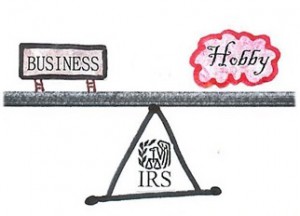Profit or Hobby: Understanding Tax Consequences of IRS Determination
October 28, 2014
Section 162 of the U.S. tax code is critical for individuals who work for themselves in a variety of occupations. When a taxpayer can demonstrate that he or she is engaged in a business venture with the objective of earning a profit, or or she can deduct necessary and ordinary expenses associated with carrying out that business. A business owner can even deduct expenses related to the business that are in excess of the total profit earned by the business, but not if their venture is classified by the IRS as a “hobby”.

When the activity is classified as a hobby, you can only deduct expenses up to the business profit- meaning that there can be no net loss. Since this issue has come up so much recently, it’s worth a review of the nine factors analyzed in Section 183 to determine if something is a hobby.
- The manner in which the activity is carried out by the taxpayer, including record-keeping
- The expertise of the taxpayer and his/her advisers
- The time and effort put forth by the taxpayer carrying out the activity
- The expectation that assets would appreciate in value
- The relative success of the taxpayer in carrying out other similar/dissimilar activities
- The history of losses or income by the taxpayer related to this activity
- Occasional profit amounts
- Whether other income sources offset the activity loss
- Whether the activity lacks factors related to recreation or personal pleasure
A recent case involving an artist demonstrates the complexity of these issues when it comes to taxation; after reporting many years of net losses during her career as an artist, the taxpayer’s business venture as such was challenged by the IRS. After careful review of the factors above, the tax court eventually determined that she was engaged in her art ventures with the intent of making a profit. As you can see by the nine factors listed above, it’s in your best interest to have a strong bookkeeping system and team of tax advisers helping you in the event that the IRS questions the nature of your business. Email us today to learn more: info@lawesq.net





